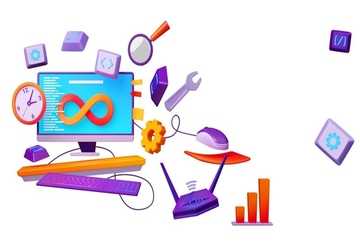In the fast-paced realm of Information Technology, the toolkit of an IT professional is the compass guiding them through the intricacies of evolving technologies. From network diagnostics to cybersecurity measures, the success of IT professionals hinges on their mastery of essential tools.
This article unveils the top seven indispensable tools, each a powerhouse in its domain, ensuring that IT experts, whether seasoned or budding, are equipped to navigate the dynamic landscape of the digital era. Join us on a journey to discover the tools that can revolutionize the way IT professionals work and empower them to stay ahead of the technological curve.

Adaptability is the key to success. As technologies evolve, so must the skills and tools of IT professionals. This article explores the essential toolkit for every IT enthusiast, unveiling the top seven tools that can make a significant difference in an IT professional's efficiency and effectiveness. From network diagnostics with Wireshark to seamless collaboration using Git and the transformative power of Docker and Splunk, each tool plays a crucial role in navigating the complexities of IT.
Understanding and troubleshooting network issues is a fundamental skill for IT professionals. Enter Wireshark, a powerful network protocol analyzer that allows you to capture and examine data from a live network or a saved file. With a user-friendly interface and extensive protocol support, Wireshark helps IT professionals identify and resolve network issues efficiently. From diagnosing latency problems to detecting security threats, Wireshark is a must-have tool in the IT arsenal.
In the collaborative world of software development, version control is paramount. Git, created by Linus Torvalds, provides a distributed version control system that facilitates collaboration among developers. Whether you're working on a small project or a large-scale application, Git allows you to track changes, manage different versions, and collaborate seamlessly with team members. Its popularity and widespread adoption make Git an essential tool for any IT professional involved in software development.
In the era of microservices and containerization, Docker has emerged as a game-changer. Docker allows IT professionals to package applications and their dependencies into containers, ensuring consistent performance across various environments. With Docker, you can quickly deploy, scale, and manage applications, making it an indispensable tool for DevOps teams. Its lightweight nature and compatibility with various platforms make Docker an essential component for streamlining the development and deployment process.
In the age of big data, extracting meaningful insights from massive datasets is a skill in high demand. Splunk, a versatile platform, provides IT professionals with the ability to search, monitor, and analyze machine-generated data. From log analysis to security information and event management (SIEM), Splunk centralizes data and transforms it into actionable intelligence. With its user-friendly interface and powerful search capabilities, Splunk empowers IT professionals to make informed decisions and proactively address issues.
Automation is a cornerstone of modern IT operations, and Ansible is a leading player in this space. As an open-source automation tool, Ansible simplifies the management and configuration of IT infrastructure. With Ansible, IT professionals can automate repetitive tasks, orchestrate complex workflows, and ensure consistency across servers and networks. Its agentless architecture and declarative language make Ansible easy to learn and implement, making it an invaluable tool for IT professionals seeking to enhance efficiency and reduce manual workloads.
In a world where wireless connectivity is ubiquitous, understanding and optimizing Wi-Fi networks is crucial. Wi-Fi Analyzer is a tool that provides real-time information about nearby Wi-Fi networks, signal strength, and channel interference. IT professionals can use this tool to troubleshoot connectivity issues, identify optimal channels, and enhance the performance of wireless networks. Whether you're setting up a new network or optimizing an existing one, Wi-Fi Analyzer is an indispensable tool for IT professionals working with wireless technologies.
In the face of evolving cyber threats, IT professionals need to remain proactive in safeguarding their systems and data. Metasploit, an open-source penetration testing framework, enables IT experts to simulate cyber-attacks, aiding in the identification of vulnerabilities within systems and networks. By using Metasploit, IT professionals can assess the effectiveness of their security measures and proactively address weaknesses. With a vast collection of exploits and a user-friendly interface, Metasploit is a powerful tool for IT professionals involved in cybersecurity.

Here are some key advantages:
Efficiency Improvement: Automation tools, such as Ansible and Docker, streamline repetitive tasks, reducing manual workload and minimizing the chance of human errors. Project management tools enhance collaboration and communication, facilitating efficient workflows and timely project completion.
Enhanced Productivity: Tools like Git enable version control, allowing developers to work concurrently on projects without conflicts, resulting in increased productivity. Data analysis tools, including Splunk, provide insights into large datasets, empowering organizations to make informed decisions swiftly
Flexibility and Scalability: Cloud computing tools, such as Amazon Web Services (AWS) and Microsoft Azure, offer flexible and scalable solutions, allowing businesses to adapt to changing requirements. Containerization tools like Docker provide a lightweight and scalable environment for deploying and managing applications across various platforms.
In the dynamic field of Information Technology, staying relevant requires a diverse skill set and a toolbox filled with the right tools. The seven tools highlighted in this article – Wireshark, Git, Docker, Splunk, Ansible, Wi-Fi Analyzer, and Metasploit – cover a broad spectrum of IT functions, from network management to cybersecurity.
By mastering these tools, IT professionals can streamline their workflows, enhance efficiency, and stay ahead of the curve in an ever-evolving industry. As technology continues to advance, a commitment to ongoing learning and staying informed about the latest tools and trends is essential for every IT professional's success.